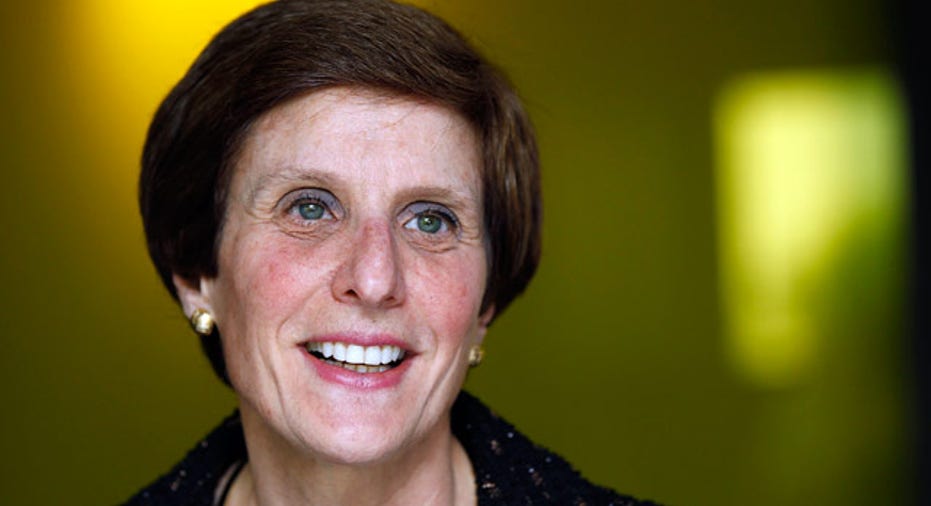Career Pointers From Kraft CEO Irene Rosenfeld

Irene Rosenfeld , chairman and CEO of Kraft Foods Inc, has served as CEO of the food conglomerate since June 2006, and says when it comes to advancing in the workplace, women need to actively work to distinguish themselves from others by thriving in new environments and accepting new challenges.
Upon becoming CEO, Rosenfeld committed to a three-year turnaround designed to drive Kraft’s profitable growth and assumed the additional post of chairman in March 2007 following the company’s spin-off from Altria Group.
With its acquisition of Cadbury in early 2010, Kraft (NYSE:KFT) is now a $48 billion global company with a foothold in snacks, confectionery and quick meals.
On a personal note, Rosenfeld calls sports her “calling card” and says she benefited from the competitiveness and camaraderie being part of a team offers.
Rosenfeld began her career at Dancer Fitzgerald Sample, an advertising agency, where she worked in consumer research. She joined General Foods in 1981, which later became part of Kraft. Following her tenure in consumer research at General Foods, she asked for the opportunity to run Kraft Canada, which provided her with the first opportunity to run a full business and turn around a company.
“I like to take a business from the bottom to the top,” she told an audience at the Catalyst Awards Conference and Dinner on March 29. The position also provided her the chance to engage in government relations and serve on the board of a public company.
A 29-year veteran of the food and beverage industry, Rosenfeld shared her insights about her own advancement and career success at the annual Catalyst Awards Conference and Dinner. Here's what she had to say:
Understand global business and the global economy: Global markets are much more intertwined than ever before and understanding the balance is imperative for today’s leaders.
Make a difference: Distinguish yourself in ways that come to the attention of decision-making folks.
Take a risk: Be willing to volunteer for positions that are challenging and that others might tend to avoid. At General Foods, Rosenfeld volunteered to oversee a troubled business division, which offered significant exposure to upper management. “This gave me exposure I otherwise may not have had. It was an important career enabler.”
Expose yourself to mentoring, but be sure to have a sponsor: Mentoring is a critical first step because it helps you learn the ropes and the unwritten rules of the road, but it’s not enough. Sponsorship goes further, and occurs when someone speaks on your behalf in meetings, or argues for you because he or she knows your interests. “It is easier to move if you have a sponsor.”
Transplant yourself to different divisions and different geographies: In a global business this is a necessary enabler to career development.
Be out and about and clear about your goals when developing relationships: By cultivating relationships, you may unexpectedly be introduced to someone who turns out to be a valuable mentor. When times get tough, leaders retrench to the people they know best.
Realize you learn as much from people who don’t like you: Their style can inform your leadership.
Exploit potential and opportunity within your own company before considering a move to another firm: This reinforces asking for what you want from superiors who are in key decision-making roles. Ill or too-quickly-considered company changes often turn out to disappoint and not meet expectations.
Learn from failures: These are important lessons to take to your next experience.
Be yourself: Women don’t have to be “minimen,” is an invaluable lesson Rosenfeld says she learned from her first General Foods boss, Ann Fudge, who broke barriers for black women in the workplace and rose to the presidency of Kraft General Foods’ $5 billion beverages, desserts and Post division before she was 50. "We have the opportunity to be role models and mentor others," says Rosenfeld. “Hang in there; we can help to reshape the environment on the job and outside.”
Do diversity right: The greatest disservice we do to diversity is filling the job with the wrong diversity candidate. People always live to regret this.
Avoid regret: Zero in on the events in which you need to participate and balance this against what is necessary for your personal life. She spoke of a time when her mother was sick and dying. “I miss her terribly,” Rosenfeld says. “Be everywhere you need to be when you have to. I have no regrets.”



















